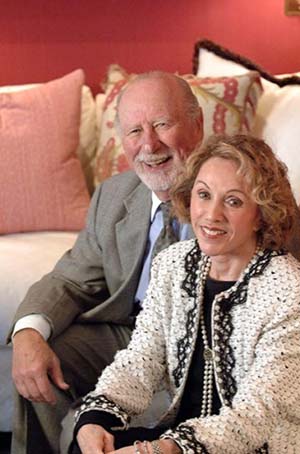Sidney Topol: Passionate About Peace
The son of immigrants, Sidney Topol is a classic American success story. He rose from a two-family house in Dorchester to a corner office in Atlanta, becoming wealthy in the process. “Making money is okay if you know what to do with it,” he cautions. “As long as when you climb the ladder, you don’t pull it up behind you.”
Now 90 years old, the Back Bay resident is busy helping others scale the ladder of opportunity by making large gifts to further public education and promote the study and practice of nonviolence.
“Sid is indefatigable in his pursuit of the very best for humanity,” says Peter Kelly, President of the Boston Latin School Association, an independent nonprofit that supports the public exam school. “He is clear that the best route forward is making sure that young people learn to walk a different path than the one that’s being demonstrated by world leaders today. He’s a personal inspiration.”
After graduating from Boston Latin in 1941 at age 16, Topol enrolled in the University of Massachusetts but interrupted his studies to become an officer in the Army Air Corps. He served as a radar officer in the U.S. Army occupying Tokyo after World War II and returned home to finish his degree in physics, pursue graduate studies at the University of California, Berkeley, and work as an engineer and executive at Raytheon Corp. In 1971, he moved south to become president of Scientific-Atlanta, a small technology firm that helped develop the first portable satellite receiver for the cable television industry. This made it possible for cable companies to create and distribute their own programming for the first time, and the firm’s revenues ballooned from $16 million to $600 million a year during Topol’s 19-year tenure as president, CEO or chairman of the board.
When Topol returned to Boston in 1990, a friend recommended the Boston Foundation as a place to do his philanthropy. He set up a Donor Advised Fund that he replenishes annually with low-cost-basis stock and has given away $3.9 million from the fund since 1991.
Topol credits his wife, Libby, and his mother, Dora, for getting him into philanthropy, and says his three daughters endorse his efforts. “They are very clear with me – it’s family money I’m giving away and they are very supportive,” he says. “They’re not interested in having my name on a building. They want to help people.”
In explaining his commitment to public education, he cites his own experience at Boston Latin and recounts a story about his granddaughter, a teacher in a New York City public school. “She called a mother about a child who had some real problems, and the mother said, ‘I can’t help you, I’m too busy trying to put food on the table.’ The public schools have to teach all the kids; the kids whose parents who aren’t interested, the kids whose parents have disappeared, the kids whose parents have been killed on the street with guns.” He calls poverty “a huge anti-education problem.”
Topol’s investments in education include gifts to Boston Latin, scholarships at the University of Massachusetts, and travel and research grants for “Topol Fellows” who are pursuing Ph.D. studies in nonviolence at UMass, Tufts and Brandeis. He also serves on the board of Americans for Peace Now, which advocates for durable Israeli-Palestinian and Israeli-Arab peace based on a two-state solution, and was honored with its inaugural Leonard Fein Justice Award this year.
“Sid would like to see people develop an understanding of how you can use nonviolence to improve interactions among communities, states and countries,” says Steve Goodwin, dean of the College of Natural Sciences at UMass Amherst. “His whole notion is to avoid conflict rather than pursue conflict management or resolution. He wants to create a set of practitioners out there who believe that that’s a possibility.”

